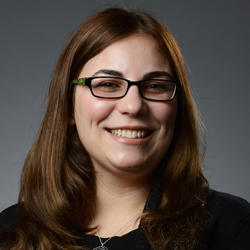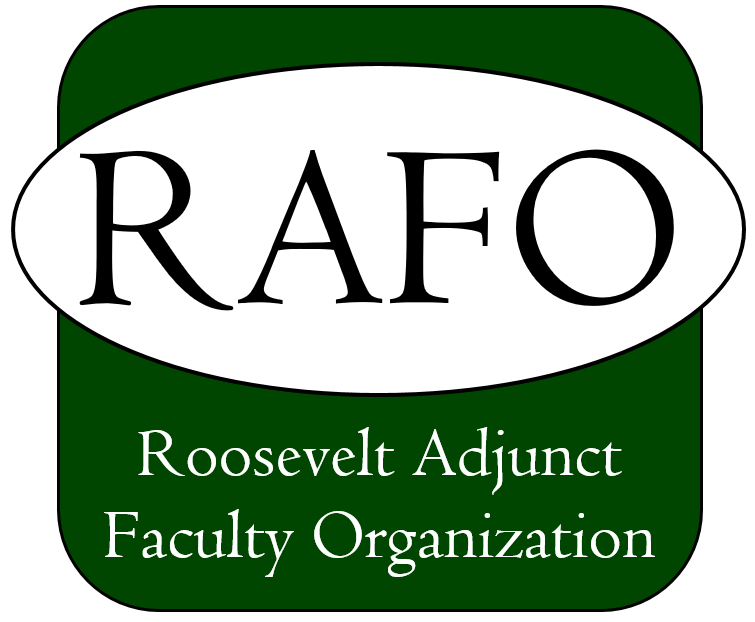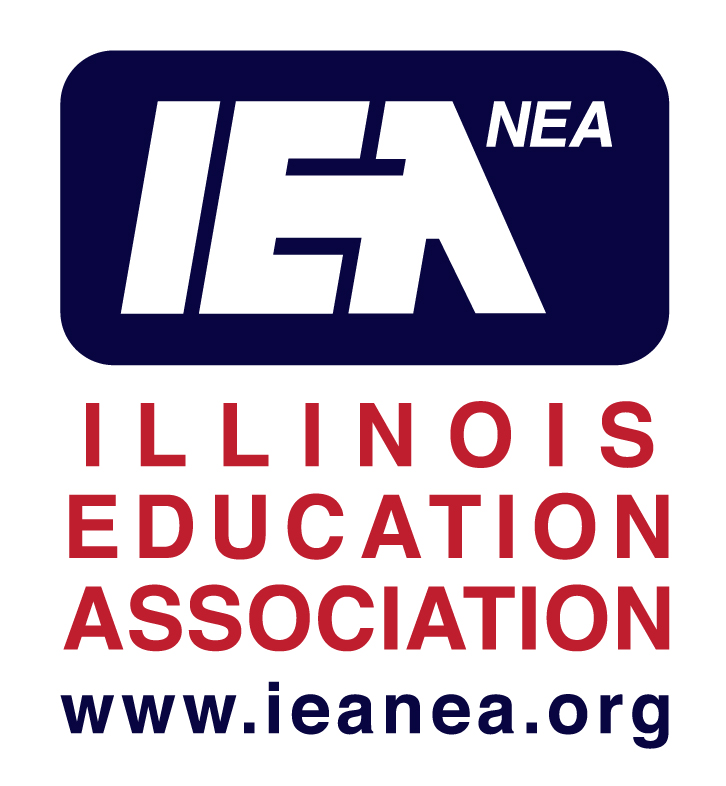Dear RAFO Members,
During my first informal sit down with President Ali, he asked me to solicit ideas from the union membership of aspects that will improve their teaching experience at Roosevelt University. Everything from office supplies to communication with specific departments to professional development opportunities can be requested. In response to President Ali's inquiry, I held several Zoom conference to request ideas from the union membership. Many union members have provided us with feedback and their ideas for improving the working conditions at RU. The final opportunity to respond with your requests will be Thursday, September 20 at either 5:00 p.m. or 7:00 p.m.
- Here is the link for the 5:00 p.m. meeting.
- This is the link for the 7:00 p.m. meeting.
If anyone wishes to meet with me in person, please email me at This email address is being protected from spambots. You need JavaScript enabled to view it. to schedule a conference for next week.
Here to serve,
Jen Wilson, President
RAFO
Dear RAFO Members,
During my first informal sit down with President Ali, he asked me to solicit ideas from the union membership of aspects that will improve their teaching experience at Roosevelt University. Everything from office supplies to communication with specific departments to professional development opportunities can be requested. In response to President Ali's inquiry, I am holding four Zoom conferences during the month of September to gather specific ideas for improving the working conditions of our adjunct faculty. Members of the Executive Committee and I will bring these ideas to President Ali, Provost Lois Becker, HR and members of the administration at the fall Presidents' Meeting with the goal of achieving some of these items outside of the confines of traditional union bargaining.
Please join our conversation about the working conditions and issues at RU with me and other members on Monday, September 10 (6 p.m. CST) or Wednesday, September 12 (7 p.m. CST). Other dates and Zoom links will follow this announcement.
To join the Monday, September 10 (6 p.m.) Zoom meeting, please use this link: https://roosevelt.zoom.us/j/272959264
To join the Wednesday, September 12 (7 p.m.) Zoom meeting, please use this link: https://roosevelt.zoom.us/j/772800895
Here to serve.
Jen Wilson, President
RAFO
By Virginia McHugh-Kurtz
I want to give a huge “Thank You!” to RAFO for allowing be to attend the Science Education for New Civic Engagement and Responsibilities 2018 SENCER Summer Institute at Santa Clara University. SENCER links science and civic engagement by connecting public issues and science. The SENCER Summer Institute consists of four days focused on many pathways of education, with tracks focused on practices that have be shown to be successful and have a profound impact. I gained insight on innovative techniques to engage students in learning about STEM in my classroom and to increase student success.
I spent a large portion of the conference attending a three-part workshop titled, “‘Thinking Like Leaders’: A Systems Approach to Improving Introductory Level Courses.” This workshop was led by many leaders in the scientific education community and aimed to improve student learning by helping them understand the components of the higher education system, the barriers within that system, and how to create change.
One session I attended was titled, “Real News of Fake News? Developing Scientific Literacy through Analysis of Media Reports.” In this session, different ways of verifying whether news is “real” or “fake” were presented, along with methods to help students identify and analyze scientific news. Identifying fake news and being scientifically literate are two important objectives in my courses, so this session inspired me to implement similar news analysis tools in my curricula.
Another session I attended was titled, “Building an Inclusive Classroom.” This session focused on the critical need to recruit and retain underrepresented minorities and women in STEM programs. The session also identified extrinsic factors on campus and in the classroom that present roadblocks for these groups and provided techniques to build a more inclusive classroom. It is important to highlight diverse scientists in the classroom and not ignore their struggles. STEM faculty needs to understand that not everyone has access to the same resources.
I am passionate about increasing diversity in STEM and creating an inclusive learning environment. Attending the SENCER Summer Institute motivates me to continue the work that I love and empowers me to make change. Thank you again to RAFO for this opportunity.
Bonnie J. Smothers, RAFO Grievance Chair
NEA-RA Report, 2018
Current events certainly brought an even greater sense of urgency to the usual intensity of a RA annual. Before the event, the nation experienced a draconian immigration policy, the Janus v. AFSCME ruling, and, as the conference drew ever nearer, the retirement of Justice Anthony Kennedy. While Kennedy did vote for Janus, he has been unpredictable during his tenure. For instance, he had been steadfast in defense of Roe v. Wade. With his departure, the choice of selecting a replacement Supreme Court Judge may fall into the hands of Trump and the GOP, both unfriendly to unions and public education. To increase the unease over the Janus decision, we delegates learned from our info packets that some NEA member had received e-mails from “MyPayMySay” prompting them to drop their memberships. Now, MyPayMySay is partially funded by the Mackinac Center, which is funded by Betsy DeVos and her family. We were also “reminded that there might be other anti-NEA people in the city—always know whom you are talking to.” Without doubt, much reason and stealth would be needed to address pressing issues, in spite of the concern and anxiety setting the stage from the beginning. For me, it wasn’t a time to take candid photographs. Some of my shots were of the huge monitor in the Assembly Hall!
Jennifer Wilson, RAFO President, will be hosting a conference open to full bargaining members and fee payers on July 19 at 7:00 p.m. to answer questions about the union, Roosevelt University, or the contract.
To join in this discussion, please click the following Zoom link: https://roosevelt.zoom.us/j/316823539.
Subcategories
Contracts
RAFO Members:
As lead negotiator for the 2020-2024 contract, I am pleased to announce that your negotiating team and Roosevelt University have come to an agreement. RAFO is extremely pleased with the final outcome and we believe you will be, too. The University was adamant on 0% for the first year, but as an offset for that 0%, we negotiated a signing bonus of $150 for each bargaining unit member that taught either in Spring 2020 or will teach in the upcoming Fall 2020 semester. That then takes us into the final three years of the contract where adjuncts will receive a 2% increase for each of those years.
As I hope you can see from the above, RAFO worked hard to ensure that you are rewarded for the professionalism and integrity all have shown during these unusual and trying times. We are attaching a copy of the final contract for you to review and eventually ratify. The areas that appear in green are changes that were made to the verbiage in the contract that will support RAFO during the upcoming 4 years. Appendix A reflects the 2% increase for each step in the final three years.
A link with the time will be sent next week for all to join this a zoom meeting, where we can answer your questions about the contract.
In closing, we hope you will be as excited as we are regarding the new contract.
In solidarity,
Don Wlodarski and the RAFO team:
Jen Wilson, Joseph Fedorko, Amelia Hicks, Stan Traywick, Mike Pinsoff and Dennis Tucker
Page 25 of 32


